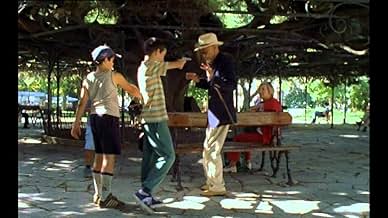João Vuvu, lives alone in a house that requires regeneration but due to being alone he is unable to do the work. On his son's release from prison and João's ensuing deception triggers a seri... Read allJoão Vuvu, lives alone in a house that requires regeneration but due to being alone he is unable to do the work. On his son's release from prison and João's ensuing deception triggers a series of somber events.João Vuvu, lives alone in a house that requires regeneration but due to being alone he is unable to do the work. On his son's release from prison and João's ensuing deception triggers a series of somber events.
- Director
- Writer
- Stars
- Awards
- 1 win total
Ligia Soares
- Narcisa the Antigona
- (as Lígia Soares)
Suzana Borges
- Hortênsia Vuvu
- (as Susana Borges)
- Director
- Writer
- All cast & crew
- Production, box office & more at IMDbPro
6.8805
1
2
3
4
5
6
7
8
9
10
Featured reviews
God Awful!
I had to see this film because my Film History 2 professor made us watch it. My professor told us that he had just come across Joao and he loved this film and he loves all of the films he has seen by him. I have no idea why though. In my opinion this was three hours of nonsense. I sat there confused the entire time. The only thing I understood about the plot was the part about his son and even that has it's holes. I also think he is kind of a copy cat because I saw many of the same sexual things that Godard did in his films. In fact, by the end of this film I felt like I had just finished watching a Godard film. I came out of class feeling confused and disgusted. I do not recommend this film to anyone unless they love Extremely slow moving films, subtitles, and a completely confusing plot. The other reason I found this film hard to watch was because it was in Portuguese and I speak some Castillion Spanish so that combined with the English subtitles drove me nuts. I think most people won't find this a problem, but I did. Again I do not recommend this to anyone. I thought the independent film "The Item" was the worst movie I had ever seen, but then I saw this one. I hope this saves a lot of people from the same torture I had to endure.
Last breath, last look.
Light, peaceful, wickedly erudite humour of a kind long since unheard of. A Portuguese film from a Portuguese film maker. A film about "everydayness" and availability to be aroused by others and by their words. An experience of declined immortality for the sake of life.
AWESOME!
I loved this film. The dialogues are wonderful and the story itself is amusing as we see J.César Monteiro in one of his best performances. The script has wonderful dialogues and is filled with bright and irreverent humour (a quality of Cesar Monteiro's writting). It's the story of an old-man (João Vuvu played by João César Monteiro) who has a son in jail and lives alone..strange events takes place as he goes to the hospital after being sodomized by a a very weird beard woman who fancies women. This is the last film by João César Monteiro because he left us this year at february..another victim of cancer..this film holds his memory.
Unique! It's life! (possible spoilers, but I don't think so...)
More than the fact that this is a filmed testament from the dying director, this movie is a lesson of life. Life and cinema showed by someone who knew both very well. It's not a lesson of moral, things are sometimes weird, so this is a complete, pertinent, not hiding anything, and leading us to all kind of enjoyment. Pleasure and contemplation are always showed with a kind of nostalgia. Also, some plans are really interesting to watch and shows a way of filming, and of seeing life very difficult to show (except in painting). Playing with different factors, (rhythm, time, some objects) it's showing this Beyond all objectivity, or with an objectivity beyond objects... Monteiro is playing with our senses...
I agree it can be difficult to watch, because it's long, slow, without a lot of cuts, neither a lot of movements, everything is done with long plans. But all that is the rhythm of an old guy watching life, and having his last pleasures, and taking time to have it. It's an ode to life in all its ways. I've never written any comments on this sites (only on message boards) but I had to write something about this one. This movie is really special and intense, (and in a soft way, what is strange...).
Until the last plan which put the character, the director, and us to eternity... (I won't say more about this plan, but it has to be seen...)
I agree it can be difficult to watch, because it's long, slow, without a lot of cuts, neither a lot of movements, everything is done with long plans. But all that is the rhythm of an old guy watching life, and having his last pleasures, and taking time to have it. It's an ode to life in all its ways. I've never written any comments on this sites (only on message boards) but I had to write something about this one. This movie is really special and intense, (and in a soft way, what is strange...).
Until the last plan which put the character, the director, and us to eternity... (I won't say more about this plan, but it has to be seen...)
A Farewell to life itself
João César Monteiro, as always, in all is movies, showed a great disregard for conventions. Branca De Neve was a good example of that, Vai e Vem is also a good example of that.
Considered a madman by some and a fraud by others, is attempts to create movies that were at the same time groundbreaking and interesting were always misunderstood.
One of the greatest and most underrated Portuguese Directors of all time, no doubt about that.
Now one thing is, if you are not from Lisbon, or if you never visited Lisbon, you won't ever understand this movie. Because this lives out from the feeling that Lisboa is... I see this as an ode to the things that João Cesar Monteiro found dearest to him. Almost a farewell to life itself, and since this was Monteiro's last film, this is revealed to be true.
The last shot of the movie is the strangest thing I've seen ever in cinema. And you can take many conclusions out of it. Maybe he's trying to invert the papers, watching the spectators as they are watching him. Saying goodbye to the people that admired is work for decades.
Just like all the good things, you need to have a developed sense of inner-depth, to stomach this. Or else you're just going to quit after the first 2 minutes.
This is a unique film-maker, this is a unique film. If you don't appreciate you can always go watch, Scary Movie or some Meg Ryan movie. There's no problem with that.
Considered a madman by some and a fraud by others, is attempts to create movies that were at the same time groundbreaking and interesting were always misunderstood.
One of the greatest and most underrated Portuguese Directors of all time, no doubt about that.
Now one thing is, if you are not from Lisbon, or if you never visited Lisbon, you won't ever understand this movie. Because this lives out from the feeling that Lisboa is... I see this as an ode to the things that João Cesar Monteiro found dearest to him. Almost a farewell to life itself, and since this was Monteiro's last film, this is revealed to be true.
The last shot of the movie is the strangest thing I've seen ever in cinema. And you can take many conclusions out of it. Maybe he's trying to invert the papers, watching the spectators as they are watching him. Saying goodbye to the people that admired is work for decades.
Just like all the good things, you need to have a developed sense of inner-depth, to stomach this. Or else you're just going to quit after the first 2 minutes.
This is a unique film-maker, this is a unique film. If you don't appreciate you can always go watch, Scary Movie or some Meg Ryan movie. There's no problem with that.
Did you know
- TriviaThe on-screen title is Vai-E-Vem, which was the pre-release title. After the film negative editing was complete, the director decided to change the title to Vai e Vem, and this is the registered title, and the promotional Portuguese title used by the Distributor company.
- GoofsWhen speaking with policewoman Bárbara, João smashes and throws an empty pack of cigarettes to the floor, and it rolls under the table. After opening the door to let Jorge in, João returns to the table starting a new cigarette and there is no empty pack under it.
- ConnectionsReferences Gone with the Wind (1939)
- SoundtracksBella Ciao
Written by Mondine
Details
- Release date
- Countries of origin
- Official site
- Languages
- Also known as
- Come and Go
- Filming locations
- Production companies
- See more company credits at IMDbPro
Box office
- Gross worldwide
- $33,429
- Runtime
- 2h 55m(175 min)
- Color
- Sound mix
- Aspect ratio
- 1.66 : 1
Contribute to this page
Suggest an edit or add missing content





























